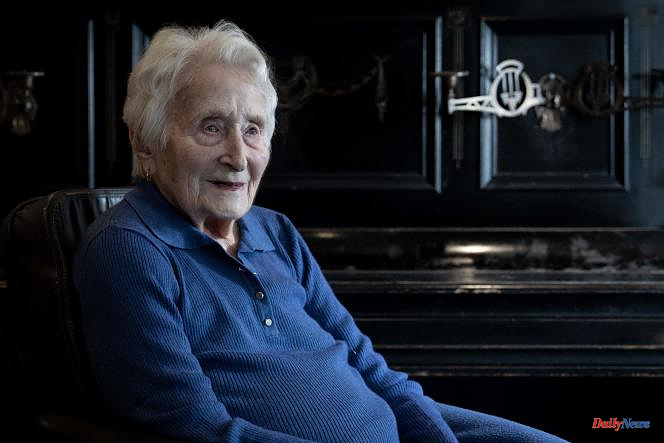Odette Nilès died on the night of Friday May 26 to Saturday May 27 at the age of 100. The communist resistant was the last survivor of the Choisel camp, where she had met Guy Môquet, her "fiancé", shot before the kiss she had promised him.
"Odette Nilès represented a century of commitment and freedom," wrote Emmanuel Macron on Twitter on Saturday, the day of the 80th anniversary of the creation of the National Council of Resistance. The national secretary of the French Communist Party (PCF), Fabien Roussel, paid tribute to "a friend and a comrade that we cherish (…) great figure of the Resistance".
A communist childhood
Born on December 27, 1922 in Paris to working-class parents, Odette Lecland – her maiden name – settled at the age of 3 with her family in the suburbs, in Drancy, in the heart of the future red belt. His father joined the PCF at the Congress of Tours. She was part of the Secours rouge and then of the Jeunes filles de France. Its heroines are Rosa Luxemburg and Dolores Ibarruri, the Spanish Pasionaria.
From the start of the war, the high school student distributed leaflets and took part in demonstrations on the Grands Boulevards in Paris. She was arrested by the French police on August 13, 1941 at the Richelieu-Drouot metro station on her way to one of them. Along with sixteen boys.
All were under 20 and were court-martialed before the Germans. The death penalty is required. Three will be executed, the others imprisoned.
She was quickly transferred to the Choisel camp, in Châteaubriant (Loire-Atlantique). In the barracks, wooden crates infested with vermin serve as beds. She meets Jean-Pierre Timbaud – he will be shot at the same time as Guy Môquet – but also Jackie, Paulette, Marie… Six great friends, the “Bistouillardes”, “sisters” for life, she declared.
For nearly three years, Odette was interned in several camps. Until that of Mérignac, from where she escaped in 1944, and joined the Resistance in Bordeaux. It was there that she met a certain Maurice Nilès, a young FFI (French Interior Forces) commander. Her future husband.
Guy, a love of youth
For a long time, she was discreet about this budding romance with the young hero of the Second World War Guy Môquet. Two teenagers aged 17 and 18 for a love affair separated by barbed wire, as ephemeral as it is eternal.
Even his son, born just after the war and named Claude-Guy, will learn only belatedly that his marital status refers to this symbol of the Resistance to the German occupier.
And then, when Nicolas Sarkozy announced in 2007 that Môquet's last letter would be read in high schools, the microphones reached out to his former lover, who was 84 years old.
So she tells, in the media and then in a book Guy Môquet, my childhood love, (L'Archipel, 2008) this meeting at the Choisel internment camp, in Châteaubriant. She was transferred there in September 1941, a month after her arrest in Paris.
They get acquainted "at the fence", the boundary between the men's side and the women's side. And exchange on both sides of the strip of land that separates the fences.
He plays the harmonica, writes poems and quickly develops a crush on Odette. He asks her one day if she would like to give him "a skate" (a kiss in slang). "I didn't know what it was but I said okay," she recalls.
He offers her a ring made from a coin. And gave him a sweet farewell before leaving for the platoon with forty-seven comrades on October 22, 1941: "I'm going to die. (…) Without having had what you promised me. »
Faithful to his communist ideal
After the war, Odette Nilès also remained faithful to her communist ideal all her life and campaigned for women's rights. Director of secular patronage of the city of Aubervilliers, she meets Yuri Gagarin and dines with Fidel Castro. Her husband, Maurice Nilès, became deputy (1958-1985) and PCF mayor (1959-1997) of Drancy.
For decades, she testified in schools, tirelessly, to bring to life the memory of her comrades who were shot.
The last survivor of the Choisel camp had peacefully passed the 100-year mark at the end of December in her retirement home in Drancy. But remained haunted by this Marseillaise sung loudly with the others to accompany their brothers in the peloton, this October 22, 1941.












